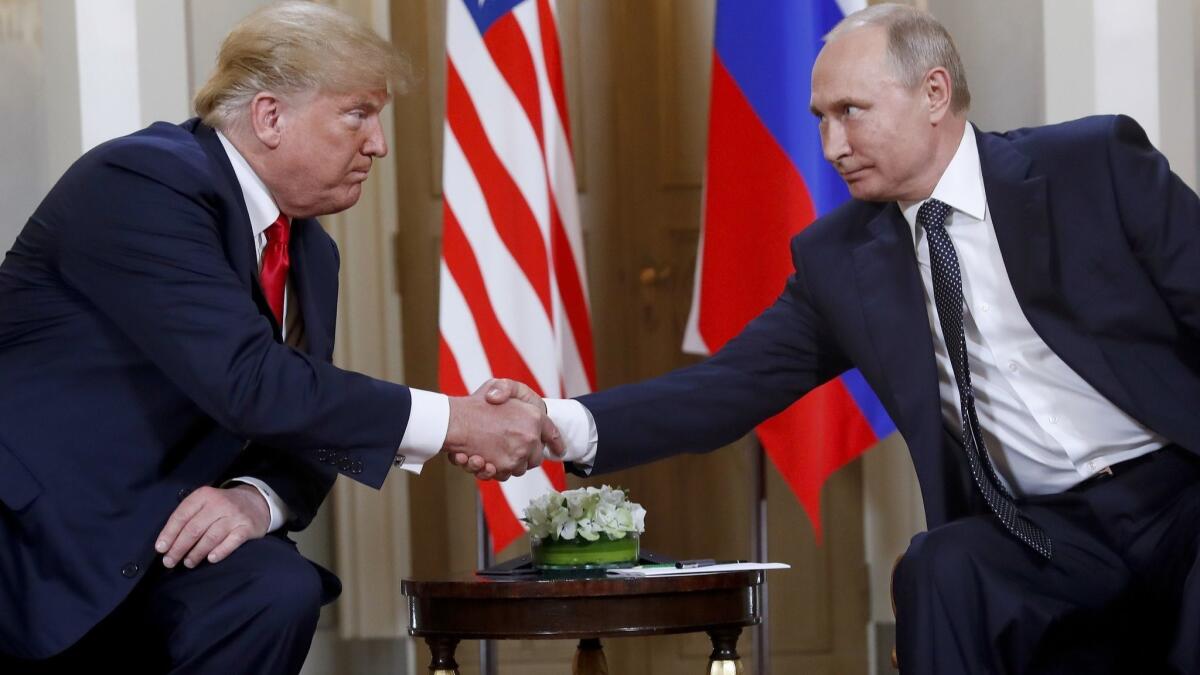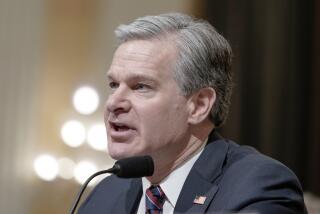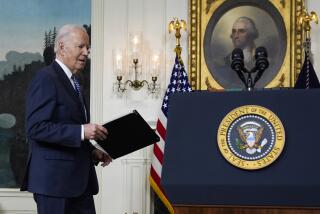Op-Ed: A question the Mueller report leaves unanswered: Is Trump a threat to national security?

In his remarks on Thursday, Atty. Gen. William Barr said the final report submitted by special counsel Robert S. Mueller III found no evidence that any American, including President Trump, had colluded with Russia in illegal activities.
But neither Barr nor Mueller’s report itself has answered a crucial question: Is Trump a threat to U.S. national security?
From the beginning, the FBI’s investigation triggered bizarre and inexplicable behavior from the president when questions about his campaign’s relationship to Russia were raised. The day after firing FBI Director James B. Comey in May 2017, Trump met the Russian foreign minister and Russian ambassador in the Oval Office, according to the report, and told them Comey was a “nut job” and “I faced great pressure because of Russia. That’s taken off.”
The FBI was clearly worried about Trump’s behavior around the time of Comey’s dismissal — the event that led directly to Mueller’s appointment as special counsel. As James Baker, the FBI’s former general counsel, testified before Congress last year, Trump’s actions presented a national security threat in addition to possible obstruction, because “the obstruction itself would hurt our ability to figure out what the Russians had done.”
Mueller’s report, released Thursday in redacted form, presents abundant evidence that Russian President Vladimir Putin ordered a massive effort to interfere in the 2016 U.S election.
Again and again we have seen that the president puts his own ego before the national security interests of the country.
It also notes that “the president had a motive to put the FBI’s Russia investigation behind him,” since a thorough FBI investigation “would uncover facts about the campaign and the president personally that the president could have understood to be crimes.”
Among these, the report notes, were the campaign’s advance notice of the WikiLeaks emails and the June 2016 Trump Tower meeting arranged between Donald Trump Jr. and what was described to him as a “Russian government attorney” with dirt on Hillary Clinton.
Trump fretted that the appointment of a special prosecutor would mean “the end of my presidency,” according to the report. It also details the president’s attempts to gain control of the investigation, including by ordering White House counsel to fire Mueller and discouraging witnesses from cooperating. Reading the report, it’s hard not to conclude that the refusal of Trump aides to do as he asked may have saved his presidency.
The special counsel’s report shows in great detail how the Russian government worked so hard to help elect Trump by leaking hacked Democratic Party emails to WikiLeaks and by spending millions of dollars on a social media influence campaign.
The report’s conclusions about Russia weren’t news to anyone who’s been paying attention. But Mueller’s report notes that Trump saw the intelligence community’s assessment of Russian interference as his “Achilles’ heel,” because it threatened to undermine the legitimacy of his election victory.
Here’s what’s so alarming about all this. Again and again we have seen — and Mueller’s report drives the point home — that the president puts his own ego before the national security interests of the country. His failure to fully acknowledge and condemn Russian interference means future elections are at risk and we likely will be dealing with the consequences for years to come.
The investigation found what it called “multiple links” between Trump campaign officials and individuals connected to the Russian government. But the report doesn’t answer the question of how and why Russia involved itself so deeply in the effort to elect Trump. Was Trump simply the lucky beneficiary of the Kremlin’s animus toward Hillary Clinton? Was Russia encouraged by Trump’s warm embrace of Putin, his call for Russia to hack Hillary Clinton’s emails, and his dismissal of the need for sanctions to curb the Kremlin’s bad behavior worldwide?
Enter the Fray: First takes on the news of the minute »
Trump’s behavior during the campaign led Michael Morrell, a former acting director of the CIA, to declare in an op-ed the summer before the election that Putin had recruited Trump as “an unwitting agent of the Russian Federation.” Indeed, Trump’s fragile ego, greed and need for admiration make him ripe for such exploitation. And Putin is a master manipulator, who spent 16 years in the KGB exploiting the vulnerabilities of his targets. James Clapper, a former director of national intelligence, observed in December of 2017 that Putin “knows how to handle an asset, and that’s what he’s doing with the president.”
If Putin had given Trump a playbook for handling issues important to Russia, it wouldn’t have looked much different from the one Trump followed. He has attacked NATO, pledged to withdraw troops from Syria and spared Russia the kind of criticism Trump regularly doles out to America’s closest allies.
The threats to national security are not limited to what was looked at in Mueller’s investigation. A congressional probe of White House security clearances revealed that the administration has disregarded the advice of intelligence agencies about potential threats to national security.
These broader issues were never within the scope of Mueller’s investigation. Even so, the report is far from being the “complete and total exoneration” that Trump has said it represents. Instead, it points out the need for another investigation: this time into whether and how the president’s actions pose a risk to national security.
Seth Hettena is a San Diego-based investigative reporter and the author of “Trump/Russia: A Definitive History.”
More to Read
A cure for the common opinion
Get thought-provoking perspectives with our weekly newsletter.
You may occasionally receive promotional content from the Los Angeles Times.






